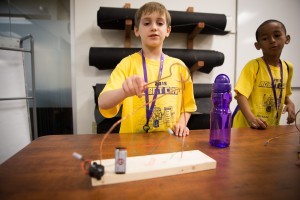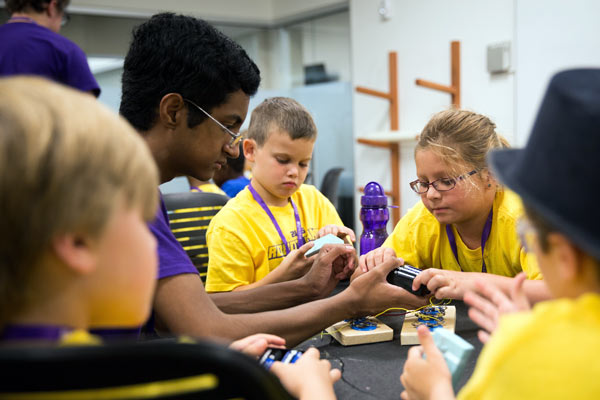Robots slid through the classrooms of James D. Hughes Center this week under the direction of young campers, ages 8-11, who carefully piloted the controllers.
The youngsters were a part of Lipscomb’s Junior BisonBot Camp — now in its ninth year. The robot experience began as a small camp and has grown into a program that now includes several weeks of robotics camps for different age groups, sponsored by the Raymond B. Jones College of Engineering and Nissan.
Robotics camp co-director Ginger Reasonover — whose son Bryan hatched the idea for the camp — has been watching young engineers build robots since the camp began in 2006.
The camp started out as Bryan’s Eagle project for scouting. The year before Bryan had been a part of BEST Robotics, a middle and high school robotics competition.
“He said ‘you know, it’d be really cool if kids knew a little bit about electronics and motors and gears before they came to BEST,’ so he put on — with the blessing and help of [Lipscomb’s] Engineering College — the first robot camp,” Reasonover said.
The first year the camp was called BERP, standing for “Bryan’s Engineering Robotic Project.”
“It was such a success and there was such a need that the university picked it up and then the year after that Nissan came along as a sponsor,” Reasonover said.
And Reasonover isn’t the only person to continue with the camp as it has developed.
Counselor David Jack started as a camper and now serves as a counselor.
“The first year that I was here it was not nearly as elaborate, but we had a lot of fun and we built more from scratch,” Jack said. “[We were using] random parts that had been brought together like plywood and PVC — raw materials — where [at this year’s camp] we’re using kits.
“So coming back [as a counselor] was really weird for me because I was used to building from scratch, and suddenly I had instructions to follow and small screws and all this stuff to use.”
Campers at the Junior BisonBots camp July 14-17 were introduced to basic mechanics, electricity and robotics concepts.
“So we’re talking about the science of robots and where robots are working within science, we’re talking about technology, we do the engineering, they learn the engineering process, they learn how to put things together,” Reasonover said.
“They learn why they need to know the engineering process, and a lot of the things they have to do deal with mathematics, so we’re teaching them STEM [Science, technology, engineering and mathematics] which is so important.”
Camp co-director Greg Nordstrom taught lectures that were followed by hands-on projects that further illustrated the lessons.
“STEM education is very important,” Reasonover said. “Across the United States, we as a country, sometimes fall behind in STEM education. We’re working really hard to try to make that better.
“In this particular camp, they learn all about STEM and they don’t even know they’re learning it.”
The campers worked on five projects over the week, including four different robots and a Buzz Wire circuit.
Camper Trevor Abruzzo explained his Buzz Wire project that he said took only 20 minutes to make.
“The metal — when it touches this [wire] it sends power through the wires, it goes to the battery and then the battery sends power to the speaker to make the noise, and so you’re supposed to try to make it all the way across [the length of the wire] without the noise going off,” Abruzzo said.
 At the end of the camp, the campers got to “show and tell” their projects to family and friends. Reasonover explained that this experience is fun for everyone.
At the end of the camp, the campers got to “show and tell” their projects to family and friends. Reasonover explained that this experience is fun for everyone.
“Robots are one of those things that they transcend gender, age, ability, socioeconomics — it doesn’t matter; everybody loves robots.”
Photo gallery by author

